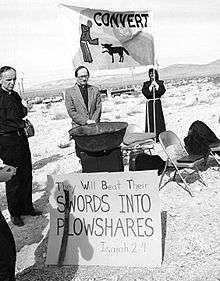Nevada Desert Experience

_002.jpg)
The Nevada Desert Experience is a name for the movement to stop U.S. nuclear weapons testing that came into use in the middle 1980s. It is also the name of an anti-nuclear organization which continues to create public events to question the morality and intelligence of the U.S. nuclear weapons program, with a main focus on the United States Department of Energy's (DOE) Nevada Test Site (now renamed the Nevada National Security Site).
History
In the spring of 1982 activists working for social justice, environmental preservation, and international peace organized a six-week peace vigil at the entrance to the Nevada Test Site, about 60 miles (100 km) from Las Vegas, Nevada. In 1983 they repeated the vigil, calling it the 'Lenten Desert Experience'.[1] This anarchist group of Christian organizers decided that the program had been successful enough to start an organization, which led to a faith-based aspect to the nuclear abolition movement. They named it 'Nevada Desert Experience' or NDE because of the work within the prayer-actions for peace that included learning to appreciate the Mojave and the Great Basin Deserts of North America. Organizers believed that appreciation of the beauty and power of the natural environment, coupled with a universal code of ethics (the Golden Rule) organically leads humans to make a stand for peace and environmental justice.
Aims
The movement's immediate goal of ending nuclear testing at the Nevada Test Site was met in 1992, when President George H. W. Bush signed a moratorium on underground nuclear weapons tests.[2] The abolition movement, led by NDE and the Western Shoshone-based Shundahai Network were sparked back into action with the renewal of non-nuclear explosions at the Nevada Test Site in 1997. These "subcritical" bombs use fissile materials which do not reach the self-sustaining chain reaction of a typical nuclear bomb. The bombs are designed by Los Alamos National Laboratory and Lawrence Livermore Laboratory, whereby the data collected can be fed to computers to simulate full-scale nuclear explosions for the US National Security Agency (NSA) and DOE. Their explosive yield is low, and small amounts of radiation may be released. Because each sub-critical experiment costs roughly US$20 million and much time from the humans working within the nuclear weapons management industry, the tests indicate to nuclear abolition activists a strong continued interest (within the U.S. Government) in favor of nuclear weapons. Therefore, the NDE continues to work for deep ecological sensitivities and social peacemaking, with one goal being to clean up and contain the contamination created by 55 years of nuclear testing in Nevada and Western Shoshone country.
Protests
From 1986 through 1994, two years after the United States put a hold on full-scale nuclear weapons testing, 536 demonstrations were held at the Nevada Test Site involving 37,488 participants and 15,740 arrests, according to government records.[3] In January, 1987, the actor Martin Sheen and 71 other anti-nuclear protesters were arrested at the Nevada Test Site in a demonstration marking the 36th anniversary of the first nuclear test there.[4] On February 5, 1987, more than 400 people were arrested, when they tried to enter the nation's nuclear proving grounds after nearly 2,000 demonstrators held a rally to protest nuclear weapons testing. Those arrested included the astronomer Carl Sagan, privacy advocate Phil Zimmermann,[5] and the actors Kris Kristofferson, Martin Sheen, and Robert Blake. Five Democratic members of Congress attended the rally: Thomas J. Downey, Mike Lowry, Jim Bates, Leon E. Panetta and Barbara Boxer.[6][7]
In protest over UAV attacks in Pakistan and the perceived extremely high danger of harming civilians,[8][9][10] in an event sponsored by Nevada Desert Experience, Father Louie Vitale, Kathy Kelly, Stephen Kelly SJ, John Dear, and others were arrested outside Creech Air Force Base (adjacent to the Nevada National Security Site) on Wednesday April 9, 2009.[11] Subsequent monthly protests have been ongoing and conducted by a number of organizations including Code Pink.[12]
See also
- Louie Vitale - cofounder, former council member, advisory group member
- Megan Rice
- Thomas Gumbleton - former council member
- Martin Sheen - former council member
- Corbin Harney
- List of nuclear tests
- International Day against Nuclear Tests
- The Ribbon International
References
- ↑ http://www.nevadadesertexperience.org/history/history.htm
- ↑ "The Status of the Comprehensive Test Ban Treaty: Signatories and Ratifiers". Arms Control Association. March 2014. Retrieved June 29, 2014.
- ↑ Western Shoshone spiritual leader dies July 18, 2007. Elynews.com
- ↑ Actor and Other Protesters Arrested at Nuclear Test Site
- ↑ Ranger, Steve (June 23, 2015). "Defending the last missing pixels: Phil Zimmermann speaks out on encryption, privacy, and avoiding a surveillance state". TechRepublic.
- ↑ Robert Lindsey. 438 Protesters are Arrested at Nevada Nuclear Test Site New York Times, February 6, 1987.
- ↑ Biggest Demonstration Yet at Test Site
- ↑ Nevada Desert Experience : Predators & Reapers - Unmanned Aerial Vehicles
- ↑ Combat Drones: Losing the Fight Against Terrorism Peace Policy.nd. October 1, 2009
- ↑ Obama Steps Up Drone Bombings Despite Civilian Deaths
- ↑ VCNV
- ↑ CODEPINK : Peace activists to rally Monday outside Creech Air Force Base: Will call for end to U.S. drone attacks in Afghanistan, Pakistan codepink4peace.org
Pilgrimage Through a Burning World, by Ken Butigan, Chronicles and discusses the political and religious aspects of the nonviolent protest against nuclear testing called the Nevada Desert Experience. 2003, 256 pp., paper.
External links
- Official website
- Western States Legal Foundation Non-profit, public interest organization which monitors and analyzes U.S. nuclear weapons programs
- Poison Fire USA Animated map of nuclear activities in the United States

